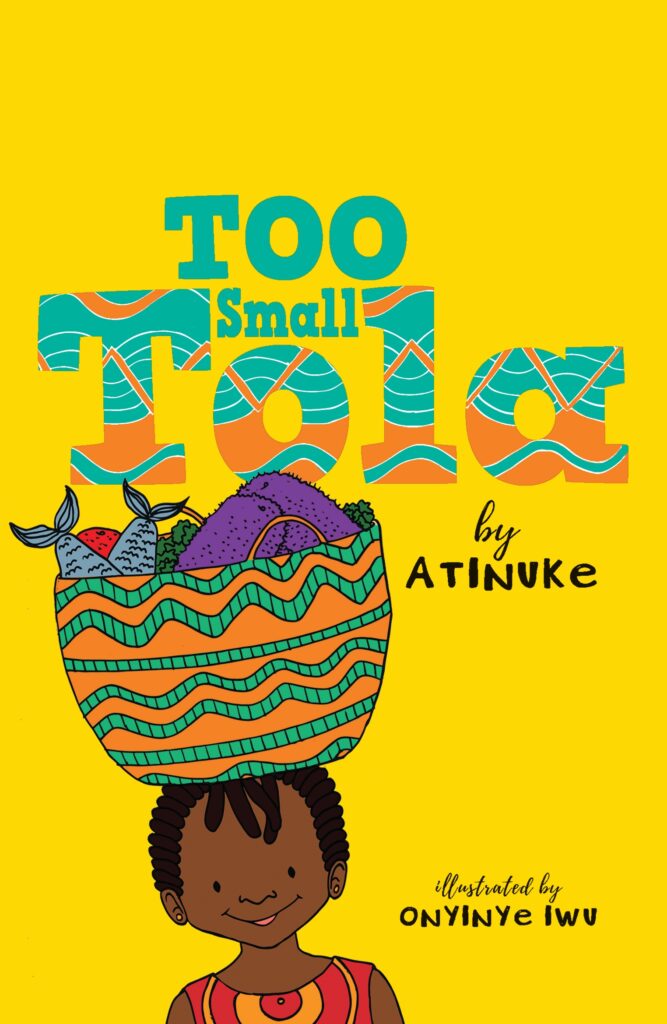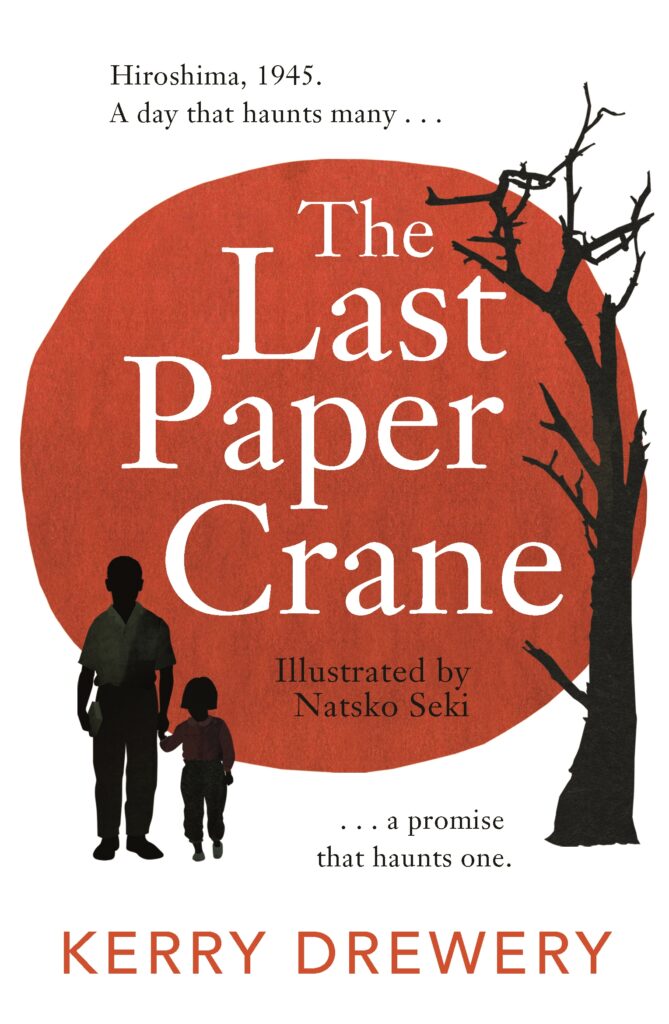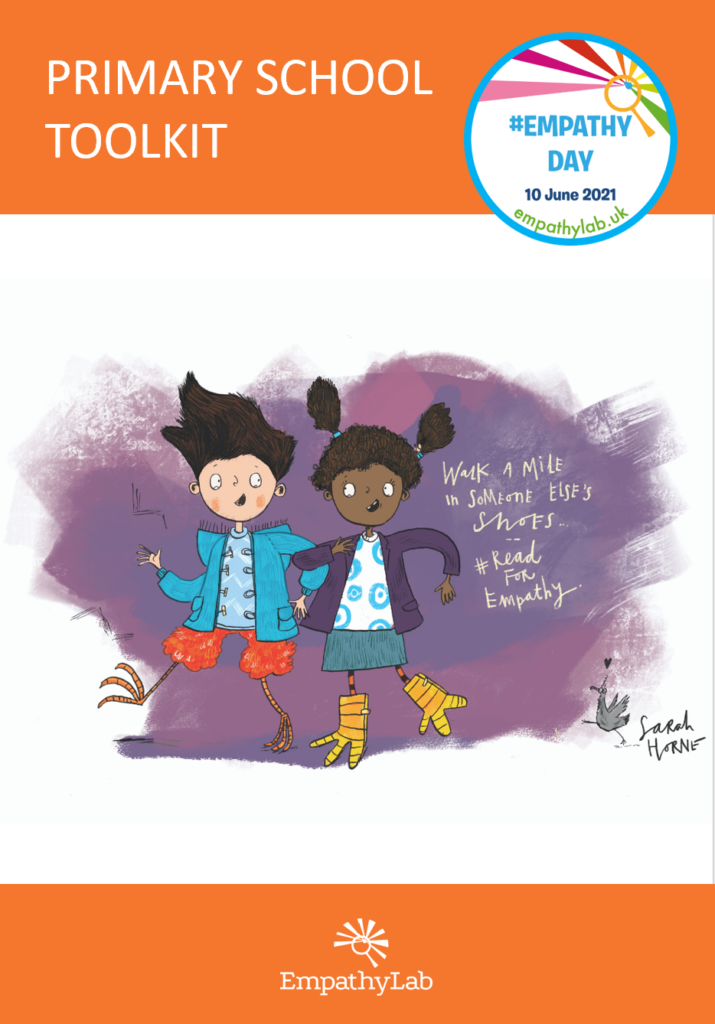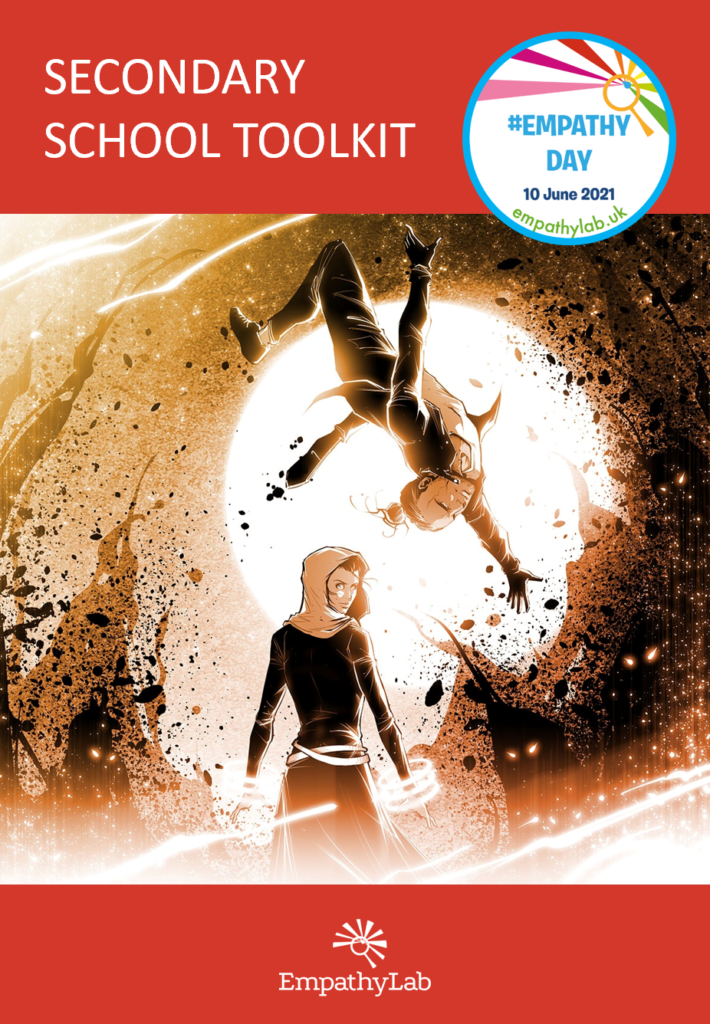How can we develop empathy in a child? Through reading. It’s no secret that reading helps children do better at school, have better outcomes and navigate the complexities of everyday life. But reading also has a deep emotional impact on children as it supports personal well-being in a truly amazing way.
I work as a librarian for an organisation called Libraries Connected that represents all the public library services in England, Wales and Northern Ireland. I am also a co-founder and co-director of EmpathyLab, a not-for-profit organisation that uniquely focuses on harnessing the empathy-boosting powers of books. We work with schools, public libraries, authors, illustrators and publishers. Every year we publish a Read for Empathy book collection, and we founded a national Empathy Day (see more on this below).
EmpathyLab defines empathy as the ability to experience and understand other people’s emotions and perspectives. It helps children build better relationships by enabling them to communicate effectively and understand the emotions of others. Empathetic children settle well into school and are ready to learn in class as they can self-regulate and manage conflict. In other words, empathy is a vital life skill.
Recent events have shown the need for empathy
During the last year, we’ve seen how necessary empathy is to our society – from the teachers who walked daily around neighbourhoods to take healthy lunches to pupils to the nurses who kept a diary for Michael Rosen in intensive care so that he could piece together the story of his Covid-19 recovery. In difficult times, empathy keeps people connected and cared for. Sadly, we have also witnessed what happens when empathy is lacking – hatred, racism and misogyny fill the void.
We can separate empathy into three parts: ‘emotional’ empathy when you feel what other people feel, ‘cognitive’ empathy when you identify the emotion a person is feeling and ‘empathic concern’ that drives you to do something to help. For empathy to flourish, you need perspective-taking skills – the ability to step outside your feelings and see the world from someone else’s viewpoint.
Book characters allow children to explore their emotions
EmpathyLab focuses on reading and stories because books provide infinite opportunities to experience the lives of others. As Noughts and Crosses author Malorie Blackman says “Reading is an exercise in empathy; an exercise in walking in someone else’s shoes for a while.” I’m sure most of you will have had the experience of being completely transported into a story and identifying so closely with the characters that you feel bereft when the final page is turned. That feeling is the result of fascinating things that happen in our brains when we read.
Neuroscience research has demonstrated that as we read, areas of the brain light up, almost in the same way as they do when we experience those situations in real life. Professor Keith Oatley explains: “Fiction might be the mind’s flight simulator.” Reading allows us to experience situations, places, emotions and behaviours from a safe distance. It gives children the opportunity to practice feelings of empathy that they can transfer to real-life situations. And, the great news is, we are not born with a fixed amount of empathy; the more we practice it, the more it grows!
EmpathyLab’s annual Read for Empathy book collection contains 50 books (primary and secondary age titles, including picture books, longer novels, graphic novels and poetry), which are beautifully written, with well-rounded characters that allow young readers to explore emotions and experiences that will provoke feelings of empathy.
In the 2021 collection, there is a picture book called The Suitcase by Chris Naylor-Ballesteros, a beautiful story about welcoming strangers that is excellent for helping children reflect on refugees’ experiences and how they might welcome rather than fear them. In contrast, Too Small Tola by Atinuke is a joyous tale set in Nigeria about a small girl who proves everyone wrong. In the secondary collection, The Last Paper Crane by Kerry Drewery is a heart-stopping story of guilt, grief and forgiveness, and the love of a granddaughter for her grandfather.


How can we develop empathy? Join us for EmpathyDayLive 2021!
EmpathyDayLive is on 10 June this year. We have a truly stellar cast of authors and illustrators contributing to the all-day online festival that can be streamed into schools and libraries. Authors and illustrators from the Read for Empathy collection take centre-stage on a day when we would love every school and every child to have an empathy experience. It is open access and can also be viewed by anyone from the comfort of their own home on our website. Last year thousands watched throughout the day.
This year’s Empathy Day theme is walking in someone else’s shoes. The festival begins at 10 am with the Children’s Laureate, Cressida Cowell, and a group of young people talking about what empathy means to them. During the day, illustrator Rob Biddulph will introduce a special empathy draw-along; authors, including Malorie Blackman, will be sharing their secrets about how they get into the minds of their character; Jacqueline Wilson will encourage everyone to listen with empathy as they eat lunch; and the Welsh Children’s Laureate, Eloise Williams, will talk to children about loneliness and empathy.
Events in the afternoon include Empathy Mirror, where author A.M. Dassu and poet Adisa will practise how to develop empathy skills through body language. In the evening, we’ll be hosting ‘The Empathy Conversation’, a live discussion with authors Michael Rosen, David Baddiel and Catherine Johnson, and Professor Robin Bannerjee.
In the run-up to Empathy Day, we’ll be launching 12 ‘empathy shorts’ – short stories on the theme of perspective-taking written by authors including Cath Howe, Sue Cheung and Jenny Pearson. All the shorts are available on our website. We’ll also be presenting an ‘Illustration Gallery’ with a team of children’s book illustrators interpreting the phrase ‘Read for Empathy’.
Many resources are now available on our website for schools to support participation in Empathy Day – a primary school toolkit and a secondary school toolkit including assembly plans, immersive and creative book activities, and an empathy ‘take-over’ to encourage everyone in school to walk in another’s shoes. We are also encouraging participants to go on an empathy walk around their local community and put themselves in the shoes of the people they see.


We’ve also launched a Family Activity Pack with 10 simple activities that families can do together, requiring nothing more than a pen and paper: stepping into the shoes of book characters on holiday, rewriting the news through an empathy lens and an empathy exhibition where everyone shares precious possessions. All activities are designed to give other family members a deeper insight into each other’s lives.
Enabling children to take action is the best way to reinforce empathy skills, and so we are asking everyone taking part in Empathy Day to make and share an empathy resolution. Our ambition is to make people think about how we can develop empathy on one day so that they make every day an empathy day. We would love you to download the Empathy Day 2021 programme and watch the festival live on our website. Join us and help answer the question for children: how can we develop empathy and build a better future.
Thank you for visiting our blog. Our vision here at Books2All is a world where every child finds the books that help them reach their true potential. If you have spare books in good condition at home that you think might be appropriate for school children, please sign up for our app’s pre-release waiting list. If you represent a school, please register to receive books for your students.

